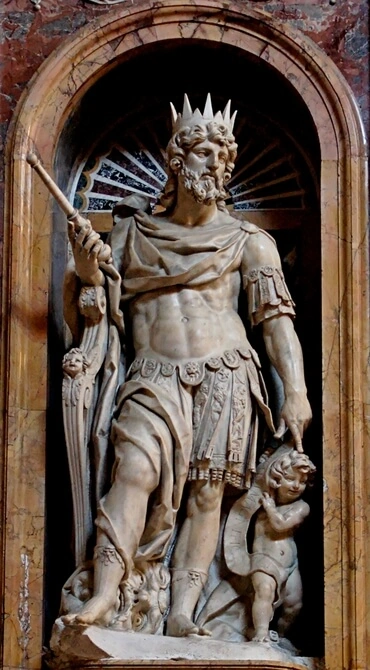1
HERRENS hand kom över mig, och genom HERRENS Ande fördes jag åstad och sattes ned mitt på slätten, som nu låg full med ben.
2
Och han förde mig fram runt omkring dem, och jag såg att de lågo där i stor myckenhet utöver dalen och jag såg att de voro alldeles förtorkade.
3
Och han sade till mig: »Du människobarn, kunna väl dessa ben åter bliva levande?» Jag svarade: »Herre, Herre, du vet det.»
4
Då sade han till mig: »Profetera över dessa ben och säg till dem: I förtorkade ben, hören HERRENS ord;
5
Så säger Herren, HERREN till dessa ben: Se, jag skall låta ande komma in i eder, så att I åter bliven levande.
6
Jag skall fästa senor vid eder och låta kött växa på eder och övertäcka eder med hud och giva eder ande, så att I åter bliven levande; och I skolen förnimma att jag är HERREN.»
7
Och jag profeterade, såsom det hade blivit mig bjudet. Och när jag nu profeterade, hördes ett rassel, och där blev ett gny, och benen kommo åter tillhopa, så att det ena benet fogades till det andra.
8
Och jag såg huru senor och kött växte på dem, och huru de övertäcktes med hud därovanpå; men ingen ande var ännu i dem.
9
Då sade han till mig: »Profetera och tala till anden, ja, profetera, du människobarn, och säg till anden: Så säger Herren, HERREN: Kom, du ande, från de fyra väderstrecken och blås på dessa dräpta, så att de åter bliva levande.»
10
Och jag profeterade, såsom han hade bjudit mig. Då kom anden in i dem, och de blevo åter levande och reste sig upp på sina fötter, en övermåttan stor skara.
11
Och han sade till mig: »Du människobarn, dessa ben, de äro alla Israels barn. Se, de säga: 'Våra ben äro förtorkade, vårt hopp har blivit om intet, det är ute med oss.'
12
Profetera därför och säg till dem: Så säger Herren, HERREN: Se, jag vill öppna edra gravar och hämta eder, mitt folk, upp ur edra gravar och låta eder komma till Israels land.
13
Och I skolen förnimma att jag är HERREN, när jag öppnar edra gravar och hämtar eder, mitt folk, upp ur edra gravar.
14
Och jag skall låta min ande komma in i eder, så att I åter bliven levande, och jag skall låta eder få bo i edert land; och I skolen förnimma att jag, HERREN, har tala det, och att jag också har fullborda det, säger HERREN.»
15
Och HERRENS ord kom till mig han sade:
16
Du människobarn, tag dig en trästav och skriv på den: »För Juda och hans fränder bland Israels barn.» Tag sedan en annan trästav och skriv på den: »En stav för Josef, Efraim, och för hans fränder av hela Israels hus.»
17
Foga dem sedan tillhopa med varandra till en enda stav, så att de bliva förenade till ett i din hand.
18
När då dina landsmän säga till dig: »Förklara för oss vad du menar härmed»,
19
så svara dem: »Så säger Herren, HERREN: Se, jag vill taga Josefs stav, den som är i Efraims hand, vilken stav ock gäller för de stammar av Israel, som äro hans fränder, och intill denna vill jag lägga Judas stav, båda tillhopa, och så göra dem till en enda stav, så att de bliva ett i min hand.»
20
Och stavarna som du har skrivit på skall du hålla i din hand inför deras ögon.
21
Och du skall tala till dem: Så säger Herren, HERREN: Se, jag skall hämta Israels barn ut ifrån de folk till vilka de hava måst vandra bort; jag skall samla dem tillhopa från alla håll och föra dem in i deras land.
22
Och jag skall göra dem till ett enda folk i landet, på Israels berg; en och samma konung skola de alla hava; de skola icke mer vara två folk och icke mer vara delade i två riken.
23
Sedan skola de icke mer orena sig med sina eländiga avgudar och styggelser och med alla slags överträdelser. Och jag skall frälsa dem och hämta dem från alla orter där de hava syndat, och skall rena dem, så att de bliva mitt folk, och jag skall vara deras Gud.
24
Och min tjänare David skall vara konung över dem, och de skola så alla hava en och samma herde; och de skola vandra efter mina rätter och hålla mina stadgar och göra efter dem.
25
Så skola de få bo i det land som jag gav åt min tjänare Jakob, det vari edra fäder bodde. De skola själva få bo där, så ock deras barn och deras barnbarn till evig tid; och min tjänare David skall vara deras hövding evinnerligen.
26
Och jag skall med dem sluta ett fridsförbund; ett evigt förbund med dem skall det vara. Jag skall insätta dem och föröka dem och låta min helgedom stå bland dem evinnerligen.
27
Ja, min boning skall vara hos dem, och jag skall vara deras Gud, och de skola vara mitt folk.
28
Så skola folken förnimma att jag är HERREN, som helgar Israel, då nu min helgedom förbliver ibland dem evinnerligen.







